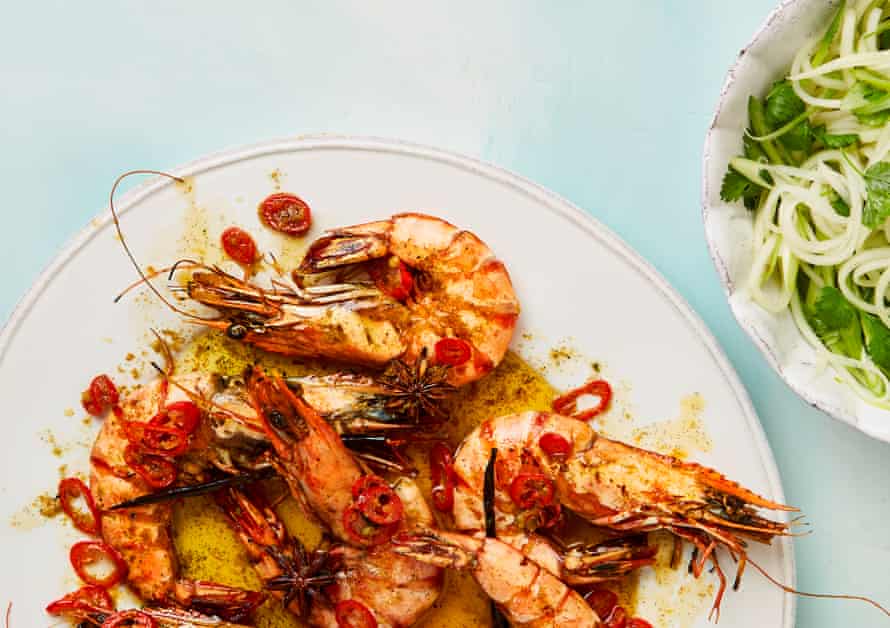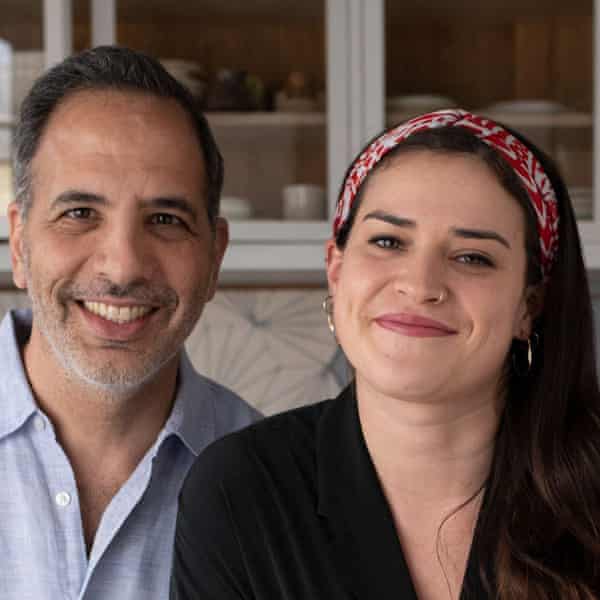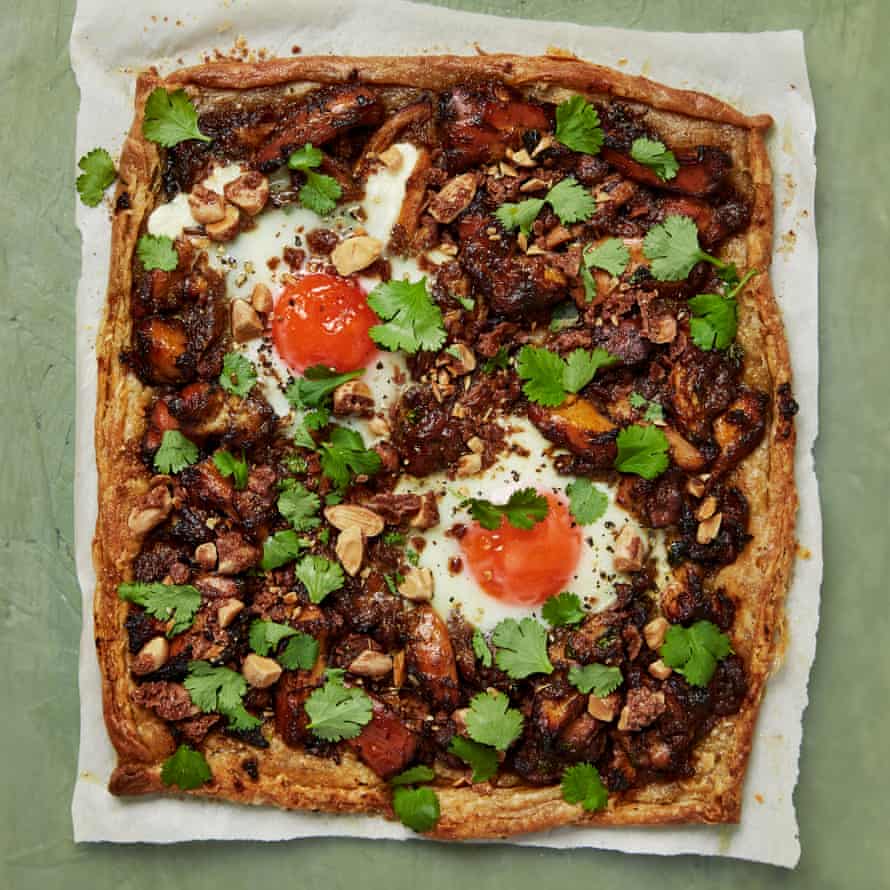‘I get the rowdiest crowds in Australia’: Yotam Ottolenghi on touring and risk-taking recipes | Food
“Australia is on a different scale,” says Yotam Ottolenghi, a chef who needs little introduction. A household name, to cook his recipes has almost become its own cuisine.
Preparing a tour that will take him away from the British winter to large theatres and convention centres across Australia’s east coast, I ask, does he find this experience strange: taking to the stage not the kitchen? “I pinch myself all the time, I’m blue all over,” he says with genuine bemusement. “I don’t really do that kind of size in other parts of the world.” And the audience? “I get the rowdiest crowds, really, in Australia.”
His Flavour of Life tour is pegged loosely to his book Flavour, co-authored with Ixta Belfrage. Audiences will hear about the influences and experiences that have made the chef indispensable to many home cooks, alongside insights into being a restaurateur. It’s sure to be tinged with our most recent global experience. In a sign of the times, the original dates were postponed for so long, he published another book: Ottolenghi Test Kitchen: Shelf Love.
“I just feel at home when I come to Australia,” he says from his home in London. “It’s weird, I’ve never lived there, I haven’t spent that much time, but it just has that kind of feeling. I have a lot of Australian friends here in London, I think I understand the culture pretty well.”

There’s an “immediacy” or recognition within his Australian audience, compared to the UK and US. “[They are] the most well versed in world cuisines, because of the nature of immigration that has happened in Australia,” he says. Thanks to waves of migration from Lebanon, Greece and all across Asia, there is, he feels, “an incredible understanding of food and how it operates, and the potential of food to cross cultures”. Australian food magazines are, he says, “probably the best in the world”, because you can see there is “an assumption that the reader knows a lot, is well versed in different cuisines and has cooked”.
Well versed and practised we might be, but that’s arguably also down to cookery writers of his ilk, from Margaret Fulton through to today’s chefs; those who have had a real and lasting influence on our food culture, driving speciality ingredients into supermarket aisles and giving once-timid home cooks the confidence to take culinary risks.
His attitude has never been about “assuming that anyone has any prior knowledge”, he says. “I’m not saying that people don’t, I just don’t want to assume that they do.” This means “every recipe and every introduction to an ingredient, method, to cuisine, that I’ve learnt or experienced” must be accessible.
He wants to make sure that “people get really deep on an instructional level” and have “a really good understanding of where they’re headed to and what results they should expect”. While he doesn’t presume high food literacy, equally he hasn’t dumbed down lists of ingredients; even when they’d be difficult to find. “I think there is a huge hunger for expanding your knowledge.”
What it means to cook Ottolenghi has changed over recent years; it has become a broader church. “It moves from being about me to being about other authors that I feature or work with,” he says. “I feel like I’m a beneficiary of those collaborations.”

Working with others means “the books are not as static … I would have probably stopped publishing cookbooks if I had to just rely on my resources personally. I’m quite open about that.”
This is the beauty of these recent books: they bring out people that have “incredible talents and a different personal story”, yielding different approaches to cooking.
Flavour with Ixta Belfrage leans on Mexican heat, ferments and umami-rich ingredients, while his latest book, Shelf Love, with the Bahrain-born chef Noor Murad is a more practical work. Borne from lockdown and people’s need to cook every meal, it’s about skills and using ingredients that have a long shelf life, “whether they’re spices or grains, jars or frozen products”.
“Noor [Murad] has really spearheaded this book,” he says. “[She’s] incredibly creative and accomplished in the way that she thinks … she sets the tone.
“I’m there and I taste and I give my opinion,” he says. A few years ago, he’d send over a list of ideas at the beginning of each week, “but now I’ve taken a step back”. “It’s much more about their ideas and they’re taking them from start to finish.
“I think now we’re in quite a good position … we know what we’re looking for when we cook a new dish, and we publish a new book.”

There’s no requirement of strict observance to ingredients, for instance. “That’s a misconception.” Substitutions have always been a part of his writing. “All those things that you could do in order to ‘get away with it’, I’ve always been supportive of … [Shelf Love] is all about that: swap the chickpeas for beans, use one grain, substitute another, remove certain items if you need to.”
He’s aware of what it means for some people “to cook Ottolenghi”. The thought that it’s about unusual, hard-to-source ingredients, long and complicated processes, topped off by lots of washing up. While it’s quite true for some recipes, it’s false for others, like three-ingredient recipes and tray bakes. “You know, it’s all good,” he says.
Getting away with it was never more necessary than in lockdown, when cooking’s effort and creativity went into recycling foods from previous days. While it did not change the way he cooks, “it has really changed the way I think about cooking and prioritising it”.
Fritters, pies and things that you could “just throw together” to satisfy the kids’ needs took centre stage, “more nutritional stuff, but not really trying too hard to push that agenda, because kids are not very appreciative of those efforts”. He says his young sons, Max and Flynn, prefer his husband Karl’s comfort foods from British fare to tacos and ramen. “But I don’t get offended.”
He has become more forgiving, lowering the level of expectation around what it means to put a meal on the table. “You know, a scrambled egg, bread and a salad for dinner is absolutely fine for me.”
But those long cooks aren’t something that he’s abandoned.
While we may have seen a race to the bottom in cooking times, with publishers touting 60, 30 and 15-minute meals, this perhaps ignores the restorative effect of slowing down and taking your time.
“There’s nothing wrong with the notion that you put in a lot of hard work, and you get something quite special at the very end of the process.”
